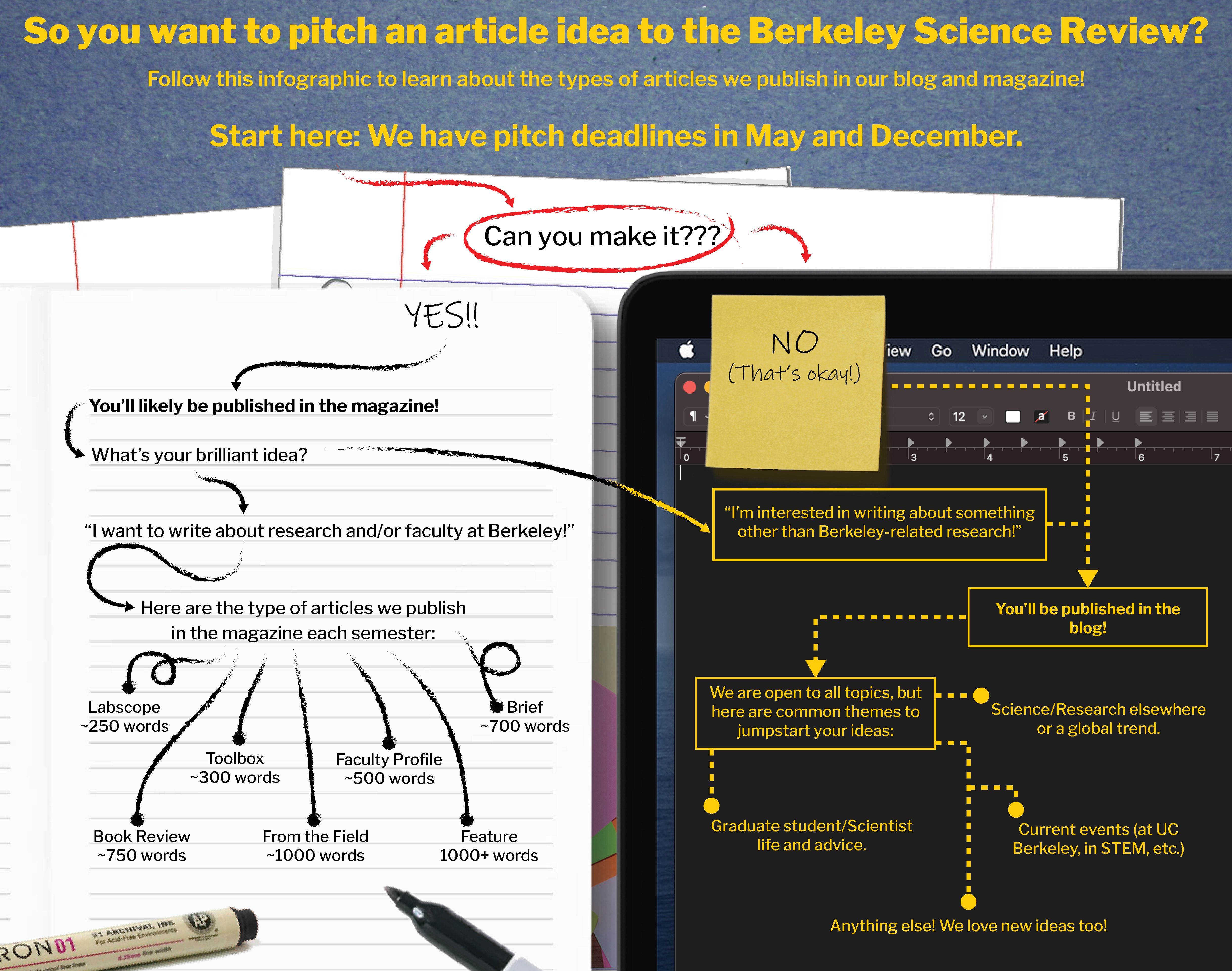Write for the BSR

If you're interested in trying your hand at science communication and you think you have a great idea, then get in touch and write for us! Pitch your idea to [email protected] and work with our team to get published (continue reading for information on pitching). You can also check our idea list to find a topic or get your creative juices flowing. The Berkeley Science Review has two main outlets: a semesterly print magazine and an online blog.
We have pitch deadlines in summer and December of each year. Submissions will likely go to the magazine.
If you can't make the summer/December deadline, or you're currently reading this in September, don't worry! We accept pitches year-round as well for the blog.
You can also suggest a story for somebody else to write. We're happy to hear your ideas!
Authors should be UC Berkeley graduate students, postdocs, or affiliates. We encourage writers to pick topics outside of their own research scope! Sign up for our mailing list to make sure you don't miss calls or deadlines for pitches.
At this time the BSR does not accept undergraduate students, but instead refer interested undergraduates to the Berkeley Scientific Journal.
For more general information about science writing, take a look at these writing suggestions or this crash course in science reporting.
Pitches
If you would like to write for the Berkeley Science Review, the first step is to send us a short query letter (a pitch) by email to [email protected]. The pitch should be about one page long and should sell your article. Tell us why your story is interesting and timely, what's the Berkeley angle, and whom you plan on interviewing. Be specific about what you plan to do and let your personality come through in your writing style. We like to see queries that are well thought-out and compelling, but if you have a more vague idea you can send that in as well.
We will let you know within a couple weeks of submission whether your story has been selected. If your story is selected, you'll be assigned an editor who will discuss possible directions for the piece, recommend resources, and generally act as a helpful guide and vigilant proofreader. You, along with your editor, will work on re-writes and drafts of the article.
Audience
Submissions should be accessible to the intelligent and motivated non-expert. When writing your article, consider whether your readers will find it comprehensible, informative, and fun to read.
Article Length and Content
We publish various kinds of articles in both the magazine and the blog, taking the content and length into consideration. Take a look at our infographic above to see which type of article might work best for you. Be sure to check out our latest magazine issue and blog posts to get an idea of our different articles too. But don't worry, if you're not sure what type of article you want to write, we're happy to work together to figure that out. We’re always looking for new, innovative writers and content.
Our magazine focuses on science research done at UC Berkeley, so all proposed topics must have a Berkeley connection. Please also check our archive of previous issues to make sure we haven't published a similar story already in the past several years.
The blog is open to research highlights from UC Berkeley and beyond, including general trends in STEM fields. We are also looking for perspectives on the graduate student experience, science policy, outreach/education, and current events as they affect STEM fields. The blog is flexible in timing and content, both for single stand-alone pieces or multiple pieces that may form a cohesive series. Look at our previous blog posts to see what we've been publishing recently.
Copyright
The Berkeley Science Review, a non-profit publication, is granted one-time print rights, perpetual electronic publishing rights, and the right to unlimited promotional use of all material (text, photography, or art) submitted for publication. These materials will not be used in any other way, or reprinted elsewhere, without the express permission of the author.
By submitting material to the Berkeley Science Review, you affirm that you are the author, creator or copyright owner of this material, and that you have the legal authority to give the Berkeley Science Review the rights and permissions described above. The Berkeley Science Review will not be held responsible for fraudulently submitted or plagiarized material.